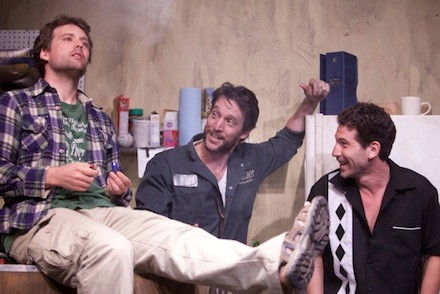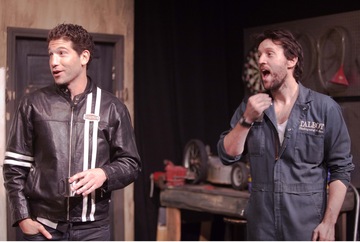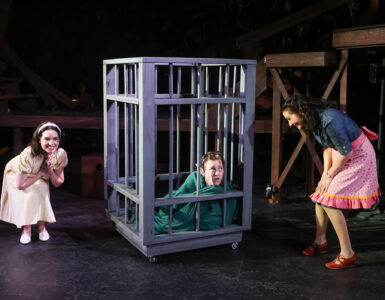***

Gentle readers, I recently interviewed actor/playwright John Pollono about his hit play Small Engine Repair.
First published, Monday, April 25, 2011.
Currently playing Monday nights and late night on weekends, in Rogue Machine’s intimate black box theater, is John Pollono’s savage and short one-act play Small Engine Repair. Featuring a tough-talking, macho cast of four males, Pollono appears as Frank, the self-confident and responsible father figure of a bunch of longtime, working class friends. Pollono recently sat down with me to discuss the genesis of his successful play, which just gained an extension to its season. “This is the third full-length play that I’ve had produced,” he told me. “I’ve written a whole bunch of one-act plays and I have some other full-length plays that have been given readings.”
Set in Manchester, New Hampshire, Small Engine Repair is a pitch-black comic drama is about three pals who, over the course of one evening, gather in car mechanic Frank’s grimy workshop for some serious drinking. They muse over about old times and chat about girls, the Internet and the mysteries of social networking. As they ‘shoot the shit’ throughout the night, a lot of beers get cracked open and a fair bit of whiskey gets tossed back.
The trio of mates includes Frank (Pollono), cocky Swaino (Jon Bernthal) and edgy and diminutive Packie (Michael Redfield). Frank has called the guys together (on a pretext) to compel the former friends to get over some bad blood. Swaino is still quick with the belittling insults and mocking comments, which are largely aimed at his insecure pal Packie. Despite some heated moments thanks to flash-point tempers, the pair ‘kiss and make up’. As they share old stories, some unkind words and hasty apologies get tossed about, but nobody stops to wonder why Frank is breaking out the good whiskey.
After a young college kid (Josh Helman) shows up to do a little drug deal with Frank, suddenly the scene turns nasty and Frank challenges his best friends to prove their undying friendship.
John Pollono is a founding member of Rogue Machine Theatre in Los Angeles, where he serves on its Art Board and handles marketing. His first full-length produced play, Lost and Found, was a small production that was staged in 2006 at the Lounge Theatre in Los Angeles. Pollono later reworked the two-hour play and last summer it enjoyed a sold-out, extended run at the FringeNYC 2010 (also directed by Andrew Block). Recalls Pollono, “That was an epic play, so it was challenging to make it fit into the Fringe, but we did.”
His second produced play was Razorback, which was staged in 2008 at Rogue Machine and directed by Elina deSantos. Explains Pollono, “It was part of their first season, called Rogue’s Gallery, where they did all these plays and then they chose one to produce and they chose mine.” One of his one-act plays, Illuminati, won Best Play at the 2010 Network One-Act Festival in New York City. Pollono’s new play Rules of Seconds was chosen to participate in the 2011 Last Frontier Theatre Conference in Alaska.
Pollono says the idea for Small Engine Repair percolated last Summer, when he was in New York for the season of Lost and Found.
Pollono – “I have some friends from where I grew up, the New Hampshire, Massachusetts area, and they came down to see the play. Because most of my work had been done on the West Coast, this was the first play of mine they had seen. So we all hung out after the show. Lost and Found is about a family from Massachusetts and one of the characters is based upon a cop that used to bust our balls when we were growing up. We used to get in a lot of trouble when we were teenagers. So they were telling stories about this guy. My friends got so wasted, and it was funny – it was like the old world. I hadn’t hung out with them for so long. My role in the group, before leaving for LA and NY, was a Frank-like guy; the more responsible one. So that night, making sure these guys didn’t get beaten up in New York City, I remember thinking, ‘So this is what it would have been like if I hadn’t left.’”
Camaraderie and longterm friendships.
Pollono says he found it interesting to observe how readily you sink into your old patterns when you return home. The characters in Small Engine Repair are based from composites of the good buddies he grew up with. “These are guys I’ve known my whole life and been through so many different things.” Pollono explains that the germ of the idea for his play arose from posing the question, ‘What if you asked your best friends to help you do something terrible?’ He wanted to explore the ultimate test of a friendship.
Pollono maintains that in the theater we often see characters that represent the author’s intellect, that act as a mouthpiece for the playwright. Yet he finds that working class characters aren’t accurately represented in plays, and seldom given a voice. “These North Eastern, somewhat blue-collar guys, who are a bit aimless, who are not the most intellectually sophisticated.” It’s these – what he calls “apolitical” – guys that he wants to see occupying the stage.
He started with these familiar, blue-collar characters before he forged his plot. “I have a six-year-old daughter and I was the first of my peer group to have a kid – we were pretty young. So, I was the first to make that transition to maturity and responsibility, when the rest of them were getting wasted and hooking up and stuff. Maybe I was doing that as well the year before, but then suddenly your priorities have to shift. So that material fed into this story.”
We see the character of Frank is rooted by the weight of this responsibility and that sets him apart from the others. Pollono muses on the challenges of bringing up a child as a single parent, “In my family I’ve seen the pain and the sadness that goes along with that, as well as the triumphs, and I wanted to see that captured, in a realistic way.”
He recalls having been raised with three sisters, as the only boy in the family, but hanging out with guys who were “totally ‘guys’ guys,” so he feels as if he straddled those two worlds. “But it’s always been an issue, and a recurring theme in a lot of my work, to have these feminist concepts coming out of the mouths of these guys who were not particularly evolved, because that was my experience.”
Having a daughter brought out his protective instincts. That, in turn, drove him to explore a storyline where all of a sudden she has arrived at the age where she’s sexually active, “…and yet you know how all buddies talk about girls. It’s difficult terrain to negotiate.”
Pollono admits he is troubled by the phenomenon of contemporary social networking, “Seeing my sister-in-law, who is 19, dealing with all these things, and all the pressures that go along with it – it really scares me. Social networking, especially among the younger kids, is really dangerous. And it’s a great thing to write about because there is no easy answer. I can’t say it’s all evil or it’s all good.
“I remember growing up when my sisters had something happen at school and they would be devastated for about a week. A teenage girl is super-emotional and they’re just starting to understand their bodies and they’re surrounded by guys who want sex, and that’s just how it is. Now they send out naked pictures and these things are never going to go away.” He adds, “There’s such a massive amount of information out there, but these kids don’t seem to care about their privacy. It’s all so complicated now.”
As Pollono highlights in his play, nineteen-year-old kids today barely remember a time when there wasn’t an Internet.
When I ask Pollono if he views Small Engine Repair as a cautionary tale, the actor/playwright demurs, “Look, I didn’t set out to do that. I try to write plays I feel passionately about, and this is something that, being a Dad, really affects me. Here’s the deal – I think a lot of times with theater if you write a cautionary tale, you’re usually inviting affluent, intellectual elite theatergoers to view your play, and they’re probably not the people who need to hear that ‘message’. So I just tried to create something that was emotionally impactful.”
But Pollono’s driving intention was to present a gut-wrenching theater experience to audiences. “I wanted to show people how pulse-pounding live theater can be, the experiential feeling of seeing this sort of story unfold. It’s always great when people leave and they’re thinking and talking about something, as they hopefully are with this, so that’s definitely a part of it. I think it makes the experience more visceral. I like strong themes, but this play has, to me, more of a universal theme of father and daughter relationships and the bond of love they share.”
He claims the social networking aspect to his script is simply part of the truthful and honest reality of these characters. “I wanted to show a more gritty, realistic version of social networking.”
Short and tough.
Pollono’s play runs at a tight, taut 70 minutes, which feels right for the subject matter, especially when, around the midpoint, it takes off like a runaway freight train. Pollono agrees the work has its own driving energy. “I felt that as soon as there was a scene or an act break – because originally it did have an intermission – then you’d be pulled out of the danger of the story and that [aspect] would get diluted. If I look at Lost and Found, which is two hours, it has maybe only 3,000 more words than Small Engine Repair. This is a really verbose play. It glides, but you don’t have any transitions or shifts or an intermission. In 70 minutes, text-wise, you’re getting a full-length pay.”
Pollono explains it was conceived as a late night play, so that permitted him plenty of license with profanity and violence. But he says that when the company members saw it was turning into something that connected on a deeper level, it was reallocated to sharing the main stage with a concurrent production of Cormac McCarthy’s The Sunset Limited.
In his play the profanity starts out casual, but when the mood changes, the dialogue actually gets less profane once the events become more serious. Pollono admits, “I love the use of profanity – it’s like poetry, sometimes. I grew up with the kinds of guys who use profanity as a disarming mechanism or a tic. It’s a class thing, it’s a social thing, it’s habit – but it’s also a way of saying you’re comfortable with your present company.”
The playwright shoots me a wicked grin as he adds, “I wanted to have the audience pulled into this world. There’s a moment hat happens in the play – and I don’t want to spoil it – that’s very graphic and the audience needs to be prepared for that. With all the [extreme] language, you start to understand their world. You need to teach the audience that they are in for surprises.”
Interview by Pauline Adamek






